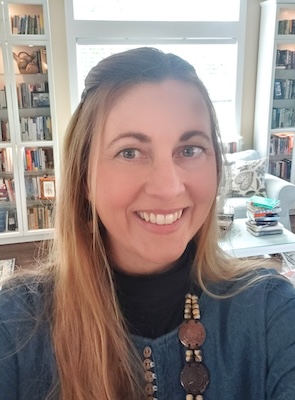
Kaecey McCormick
Poetry
Originally from New England and after two decades in Maryland, Kaecey McCormick now writes poetry and fiction in the San Francisco Bay Area. She is the winner of the 2023 Connecticut Poetry Prize, past poet laureate for the city of Cupertino, and an instructor at The Writers Studio. Her work has appeared in many literary journals as well as her two chapbooks Sleeping with Demons (2023) and Pixelated Tears (2018). When not writing, you can find Kaecey hiking, painting, or reading a book. Connect at www.kaeceymccormick.com/.
Two Weeks after My Daughter Arrives Home from a Residential Treatment Center for Girls
I bring my daughter’s body with me to visit my sister’s stone. My daughter died, not for the first time, a month before. We flew her body an hour south to a suburb outside Los Angeles where it stayed for four weeks before they shipped her body back to us. When we picked her body up at the airport, she wouldn’t tell us what they did to it. I hate to bring people with me to the cemetery and I can’t stand to go alone. My daughter’s body is a kind of in-between, and it fits beside me in the black box I drive to the grave. On the way there, I complain about the distance between our house and my sister’s permanent address. Stops along the way. Inevitable detours. One-way streets. It’s taking so very long to reach her, I say. My daughter’s eyes stare at the lines in the road. When we arrive, there is a family crowded around one of my sister’s neighbors. A woman kneeling on dirt the next row over. A boy with a man who could be his father or someone else comforting each other across the way. The living have left toys and jewelry and newspaper clippings and pumpkins and pieces of fruit. Everywhere flowers. The smell of ash in the air. Your aunt’s birthday month is always busy, I say as I pull my daughter’s body from the car. November. All Souls. The month of remembrance. As if we could forget. My daughter’s shadow stops at the first grave we cross. It stays there. Her body follows as I make my way to my sister. At first, I try not to step on the dead, but soon I no longer hear their bones crunching beneath our feet. My sister waits where my parents left her, shivering in the endless shadow of the split oak next to her bed. Her ribs rattle and shake in time with its leggy branches. I didn’t bring flowers, I tell my sister. I brought my daughter instead. They’ve never met. This is my sister, I tell my daughter’s body after an awkward pause. Her body sways a little in the breeze, and I pretend the movement is a nod. In the distance, my daughter’s shadow rises and lengthens to slide across stones. It reaches my daughter’s feet where it winds around her body like a cat. The shadow, my daughter’s body, and I stare in silence at my sister. Her stone stares back. When the sun starts to slip beneath the hill, my sister whispers to the split oak. I can’t understand the words, but I recognize the tone. I turn to my daughter’s body. It’s time for us to go.
“ I’d been sitting with heavy emotions tied to grief, loss, and trauma, and how they reshape our sense of self and family, and I wanted to write about this. The physical act of visiting my sister’s grave grounded the exploration, helping me to confront the past and its residual effects in the present. And by portraying my daughter’s body as a liminal entity with a matter-of-fact, stark speaker, I could explore the dissonance between external expectations and internal experiences of trauma without sinking into sentimentality. ”
